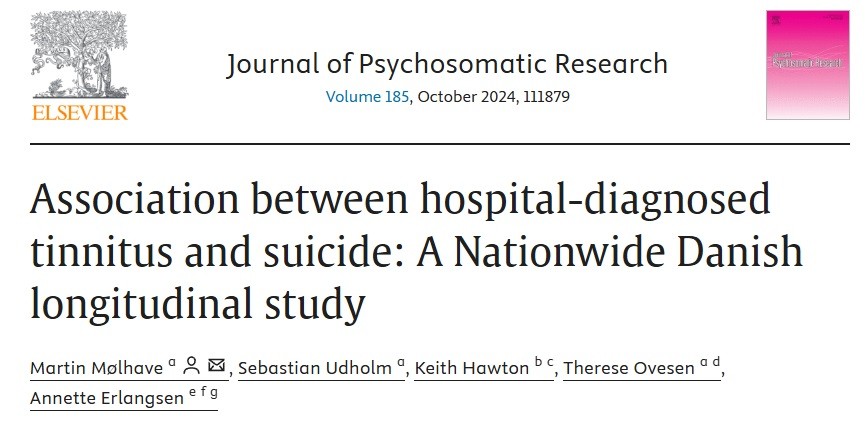People with a hospital-diagnosed tinnitus have a 40% higher suicide rate when compared to those without a such diagnosis. This is the finding of a new study conducted in Denmark and highlights the critical need for awareness and support for patients who are challenged by their tinnitus.

The study was conducted by Dr Martin Mølhave of the University Clinic of Flavour, Balance and Sleep at the Department of Otorhinolaryngology, Head and Neck Surgery, Gødstrup Hospital in collaboration with Danish Research Institute for Suicide Prevention and University of Oxford. The study, which is published in Journal of Psychosomatic Research, demonstrates a significant association between tinnitus and suicide based on analyses of data on more than 7.4 million Danish residents collected over the past 30 years.
Individuals who numerous times attended hospital due to tinnitus had an even higher suicide rate, especially during the time of and shortly after their hospital contact. The highest suicide rates were found among those with both tinnitus and mental disorders, thus, highlighting the challenges if there are pre-existing conditions.
“Conclusive evidence regarding the link between tinnitus and suicide risks did not exist, which is why we decided to conduct this study,” explains medical doctor Martin Mølhave. “Tinnitus presents a challenge in the clinical setting, as there is no curative treatment for most patients. It is our experience that some patients are highly affected by their tinnitus. It was therefore very important for us to investigate to identify high-risk groups and determine when risks are particularly pronounced.”
Tinnitus has been described as the hearing of sounds, such as ringing, although there is no external noise. It has been linked to hearing loss and may be a significant source of distress. Globally, about one in seven people experience tinnitus, of which approximately 2% experience severe problems. In Denmark, one in eight people reported to have tinnitus in 2021. Of these, 4% considered that tinnitus impacted their health negatively, equivalent of nearly 200,000 Danes.
“Suicide is a rare event, so even though there is a 40% increased risk among people with tinnitus, this affects only few patients”, says senior researcher Annette Erlangsen from DRISP. “In the general population, approx. 16 out of 100,000 people die by suicide each year. For patients with tinnitus the suicide rate is approx. 24 out of 100,000 people per year. Nevertheless, it is important to pay attention to those patients who have difficulty with tinnitus.”
The negative effects of tinnitus may be alleviated through counseling, cognitive-behavioral therapy, and sound therapy. It is possible that these types of support also may help reduce risks of suicide. The findings from this study underscore the importance of reaching out with support and effective interventions.
DRISP:
- Annette Erlangsen
Link to the study:
Collaborative partners:
- Martin Møllehave, Sebastian Udholm og Terese Ovesen Universitetsklinik for Flavour, Balance og Søvn ved Afdeling for Øre-, Næse- og Halskirurgi, Regionshospitalet Gødstrup.
- Keith Hawton, Centre for Suicide Research, University of Oxford, United Kingdom.
